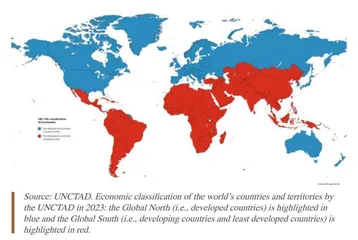Contemporary Global Security Landscape:Risks and Challenges to the Global South
作者: Joseph Ochogwu

Current analysis of the contemporary global security situation is incomplete if the issues of the Global South’s security interests particularly the Africa’s security needs and concerns are left out of the discussions. Today, the focuses are on the Middle East crises whose major players are Israel and the United States of America against Gaza and the larger Palestine including Lebanon, the Russia-Ukraine war and the perpetual geopolitical tensions between the North Korea and South Korea. Most of the deliberations and considerations of the great powers that mainly make up the Global North are focused on geopolitical competitions and their dominance over the Global South, including Africa, which is the least developed. The continent is at a critical juncture in terms of global security threats and challenges. Protracted wars, extreme poverty, hunger, diseases, illiteracy, and despondency remain critical challenges exacerbated by global geopolitical rivalries and the continent’s unequal relations with the outside world.
Despite the United Nations’ 1945 resolve when it was founded after the World War II to end conflict and violence, and most recently to ensure warring parties to ceasefire in Sudan, the protracted violence in the Democratic Republic of the Congo, and the Israeli-Hamas crises in Gaza, and many other regional crises are still being waged. Death, displacement and suffering have affected many populations, mostly women and children. The fear of use of nuclear weapons has never been heightened to this current level in human history. According to the United Nations Conference on Trade and Development (UNCTAD), the circumstances of colonial history, economy and politics that have often characterised most of the Global South countries are responsible for their limited, though differing levels of wealth, income inequality, strength of democracy, and industrial and educational opportunities.
The questions at the bottom line at this moment of global security conundrum and apprehension are: What does the term Global South mean in international politics and diplomacy? What is the current security landscape in the world? How does this security situation affect the Global South, particularly Africa in terms of risks and threats? What can be done to address these concerns? But before attempting some answers, it is important to describe what Global South means and which regions are comprised of the Global South.
The Notion of Global South
As it is being used in geopolitical realm, “the Global South” refers to many of the countries that are in the Southern Hemisphere, largely in Africa, Asia and Latin America, though countries in the Northern Hemisphere like China and India are also part of the Global South. According to Jorge Heine in the Conversation, “the term appears to have been first used in 1969 by political activist Carl Oglesby…” “…to describe centuries of northern dominance over the Global South to produce an intolerable social order.” But the term gained momentum after the 1991 breakup of the Soviet Union, what is commonly used for developing countries that are yet to industrialize fully as “Third World”, which made the pillar of the Non-Aligned Movement in 1961.
But going by the historical descriptions in which the rest of the world besides the developed countries have gone through, terms such as “Third World”, “underdeveloped countries”, and “developing countries” have been replaced by terms like the Global South in which the UNCTAD, China, and others are championing under the multilateral frameworks of cooperation and development initiatives. Interestingly, many of these terms metamorphosed in meaning during the Cold War into a bipolar alignment between the West Bloc led by the United States and the East Bloc led by the Soviet Union.
The terms generally describe regions or peoples plagued by poverty, diseases, and instability. For instance, the Western media and academic literature used the terms up to the 1990s globalization to mean the lowest-cadre of peoples or races in the world, while the developed or First and Second World were portrayed as advanced. Wars, violence and displacement have been some of the features of the developing countries that are now being described as the Global South.
One might have thought that geography played a role in designating the Global South. But, as pointed out earlier, countries like China and India in the Northern Hemisphere are also members of the Global South. Commonalities or dynamics in politics, geopolitics and economy are a few of the things that unite the countries of the Global South. Nevertheless, the Global South has become a widely used expression in international politics and diplomacy particularly among those countries with a common position on global issues.
According to Heine, the Global South countries are “mostly at the receiving end of imperialism and colonial rule, with African countries as perhaps the most visible example of this.” Global governance is skewed against those countries, as none of the African countries are UN Security Council members. Despite what the term was meant to sound compared to the offensive Third World or developing countries, the global order is twisted against most of the countries in the Global South. Besides economic dependence on the West or the Global North since most part of modern history, the countries in the Global South have been at the receiving end of geopolitical rivalries, wars and adverse effects of technology that are primarily originated in the Global North. While the Global North is characterized by massive wealth, democratic governance, peace and stability and constantly prone to human progress, the Global South appears to be a zone of turmoil, war, conflict, poverty, anarchy and tyranny. Perhaps, Africa has been the region mostly suffering from such rivalries and competitions that have resulted in wars, conflict and instability. Also, some that are instigated by the ex-colonial powers have crippled the continent’s growth and development since the independence in the 1960s.